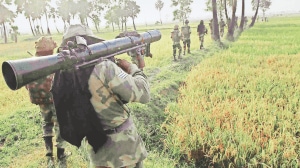‘Based purely on apprehension’: Chhattisgarh HC dismisses plea seeking probe into senior Maoist leader’s ‘encounter’
In his petition, senior Maoist leader Katha Ramachandra Reddy’s son had alleged that his father was killed in cold blood.
 A Division Bench of Chief Justice Ramesh Sinha and Justice Bibhu Datta Guru dismissed the plea, noting that Reddy was a “habitual offender”. (File photo)
A Division Bench of Chief Justice Ramesh Sinha and Justice Bibhu Datta Guru dismissed the plea, noting that Reddy was a “habitual offender”. (File photo)The Chhattisgarh High Court on Wednesday dismissed a petition seeking an inquiry into the alleged encounter of senior Maoist leader Katha Ramachandra Reddy, calling it “based purely on apprehension.”
Reddy, alias Vikalp, a Central Committee Member (CCM) of the banned Communist Party of India (Maoist), was gunned down by security forces in Narayanpur district’s Abujhmad on September 22. In his petition, Reddy’s son, Raja Chandra, alleged that the encounter was “staged” and sought a Special Investigation Team (SIT) probe.
A Division Bench of Chief Justice Ramesh Sinha and Justice Bibhu Datta Guru dismissed the plea, noting that Reddy was a “habitual offender” against whom “a number of criminal cases were registered” and that “he had left his house way back in the year 2007.”
“His whereabouts were not known either to the petitioner or his mother, and they only came to know through media reports when the dead body was found. As such, it can be assumed that the deceased had been actively involved in Naxal activities and was operating in the forest areas where such injuries are not uncommon,” the court said.
“Directing investigation by SIT into such regular field operations would not only undermine the federal structure of policing powers but also set a precedent inconsistent with established legal and administrative principles. Only in instances where credible allegations of excesses, misuse of power, or violations of human rights arise, and where an impartial probe is deemed necessary to uphold justice, can the judiciary consider entrusting such matters to the SIT. No such circumstances exist in the present case,” it said.
Reddy was killed as part of the ongoing anti-insurgency operation ahead of the Centre’s March 2026 deadline to “eliminate Left-Wing Extremism.” Police claim he was responsible for killing nearly 75 security personnel.
In his petition, Raja Chandra argued that it was “highly suspicious that no other Maoists or security forces have died or injured in the so-called encounter,” alleging that his father was killed in cold blood.
“Both the parties were hundreds in number and after the encounter, only two persons died, and those were the members of the Central Committee of Maoists. Normally, a Maoist leader of high rank is protected and surrounded by many other Maoists,” he said.
He also questioned the timing of the encounter, noting that it came amid divisions within the Maoist cadre over whether to give up arms. Reddy, he claimed, was opposed to surrender.
“The circumstance and the timing indicate that the deceased persons were nabbed alive by the police with the help of their own party members… After the deceased were caught/taken in custody, they might have been taken to the jungle and killed by the security forces,” he alleged.
Raja Chandra had first approached the Supreme Court, which directed him to move the High Court but ordered that Reddy’s body should not be cremated or disposed of until the plea was heard.
Arguing before the HC, Chandra’s counsel Colin Gonsalves said, “Even if the deceased was a Naxalite or a member of the banned Maoist organization, the police/security personnel had no authority to execute the deceased in a brutal manner after torturing him, which is evident from the three puncture injuries found on the body of the deceased.”







